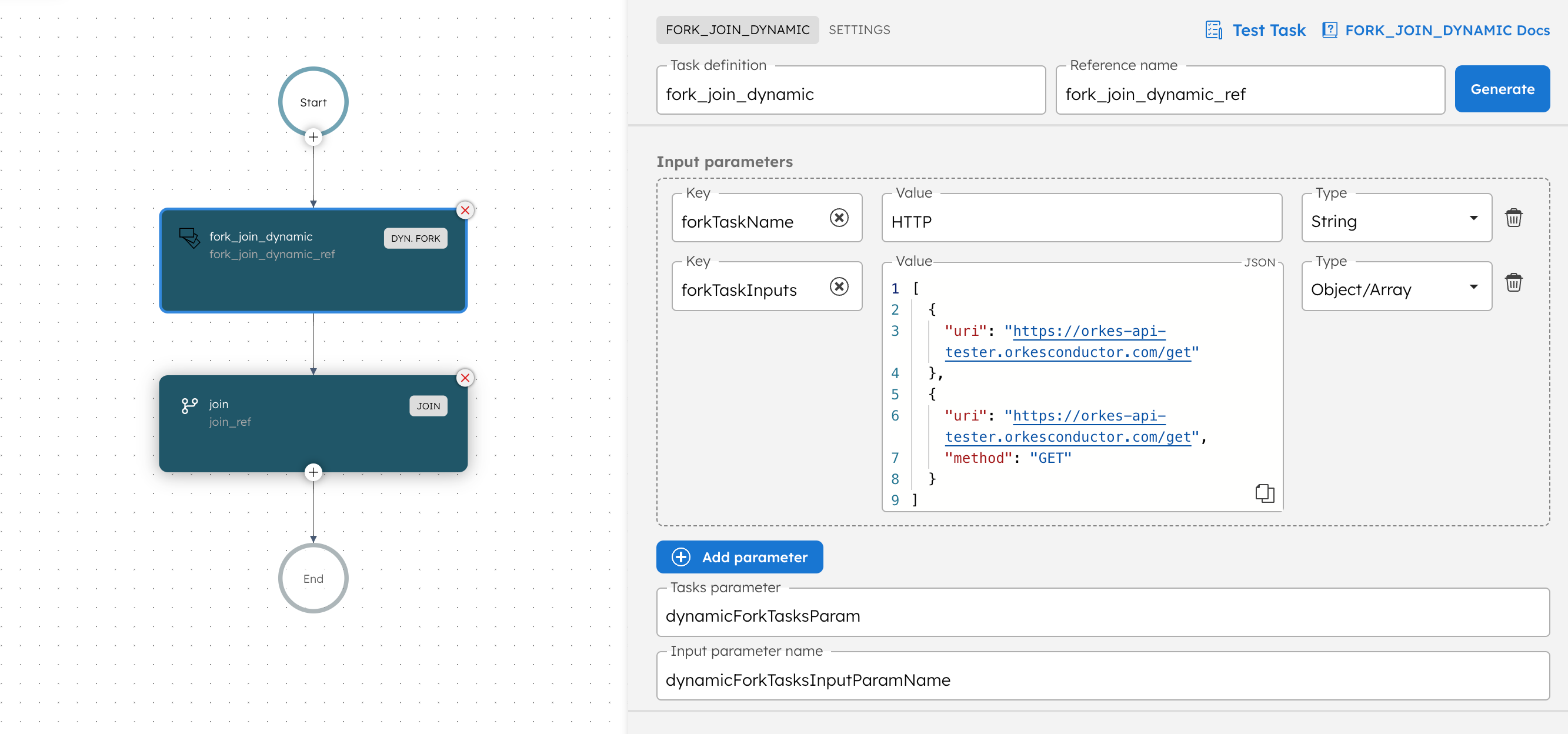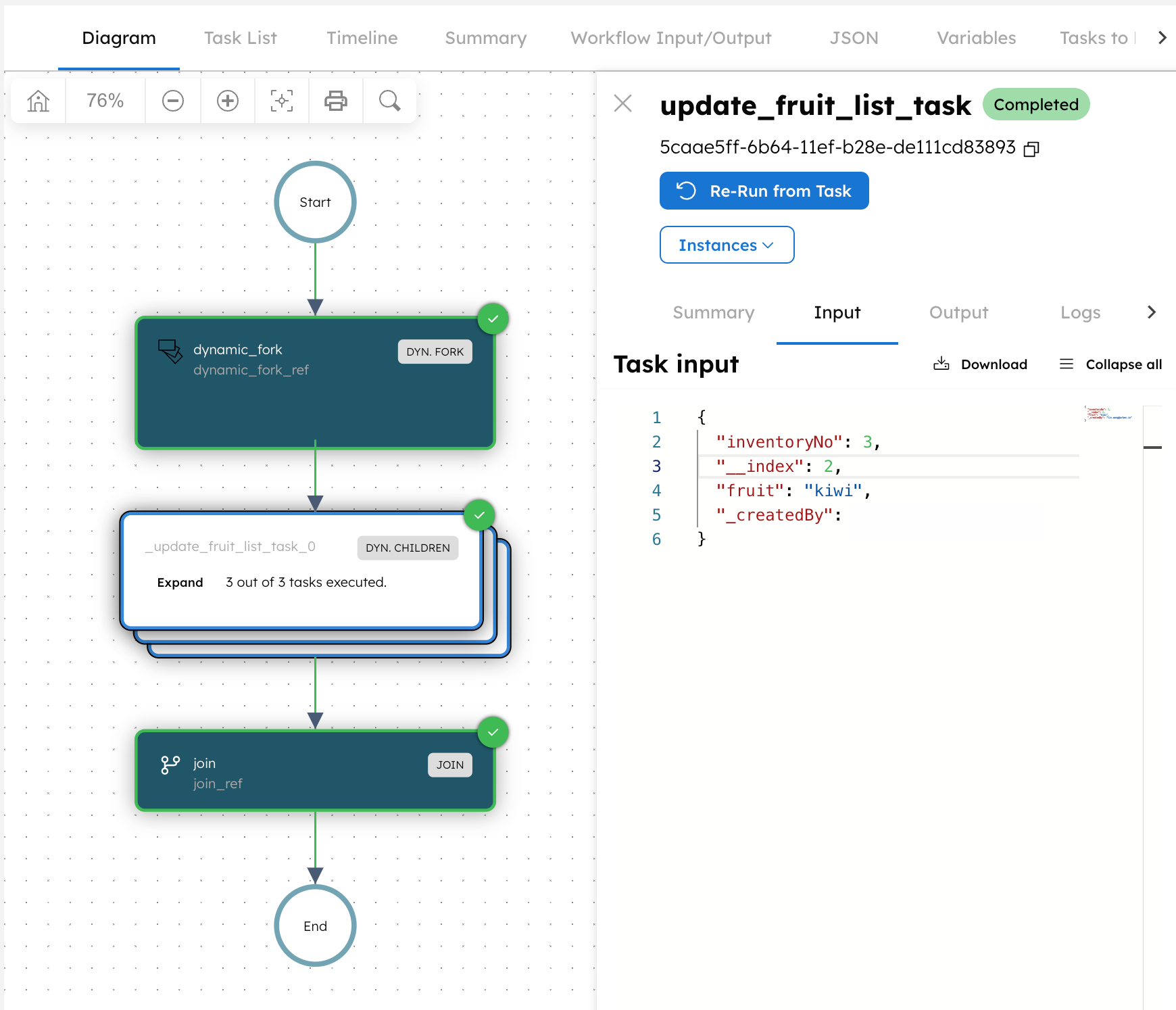Dynamic Fork
The Dynamic Fork task is used to run tasks in parallel, with the forking behavior (such as the number of forks) determined at run-time. This contrasts with the Fork/Join task, where the forking behavior is defined at workflow creation.
The Dynamic Fork task must be followed by a Join task that waits for the forked tasks to finish before moving to the next task. This Join task collects the outputs from each forked task.
Unlike the Fork/Join task, a Dynamic Fork task can only run one task per fork. To run multiple tasks per fork, you can use a Sub Workflow task inside the fork.
There are two ways to run the Dynamic Fork task:
- Each fork runs a different task—Use
dynamicForkTasksParamanddynamicForkTasksInputParamName. - All forks run the same task—Use
forkTaskNameandforkTaskInputsfor any task type, orforkTaskWorkflowandforkTaskInputsfor Sub Workflow tasks.
Task parameters
Configure these parameters for the Dynamic Fork task. The input payload for the forked tasks should correspond with their expected input. For example, if the forked tasks are HTTP tasks, the input should include the method and URI.
For the Fork task:
- For different tasks
- For the same task (any task type)
- For the same task (sub-workflows)
The dynamic fork executes each task in the array specified by dynamicForkTasksParam with its corresponding input specified by dynamicForkTasksInputParamName. The number of forks created at runtime corresponds with the array size.
| Parameter | Description | Required/ Optional |
|---|---|---|
| dynamicForkTasksParam | The input parameter key whose value will be used to schedule each task on a different fork. For example, "dynamicTasks", which will then be specified as an input parameter in the Dynamic Fork task. | Required. |
| inputParameters. dynamicTasks | An array of tasks that will run in parallel. Each array element is a task configuration that corresponds to a separate fork branch. It can be passed as a dynamic input. | Required. |
| dynamicForkTasksInputParamName | The input parameter key whose value will be used to pass the required input parameters for each forked task. For example, "dynamicTasksInput", which will then be specified as an input parameter in the Dynamic Fork task. | Required. |
| inputParameters. dynamicTasksInput | A map where the keys are the task reference names for each fork and the values are the input parameters that will be passed into its matching task. It can be passed as a dynamic input. | Required. |
Configure these parameters to execute any task type except Sub Workflow tasks.
The dynamic fork executes the task specified by forkTaskName for each element of forkTaskInputs. The number of forks created at runtime depends on the number of forkTaskInputs sent. Configure these parameters to execute any task type except Sub Workflow tasks.
| Parameter | Description | Required/ Optional |
|---|---|---|
| inputParameters. forkTaskName | The name of the task that will be executed in each fork. It can be passed as a dynamic input. | Required. |
| inputParameters. forkTaskInputs | An array of JSON inputs for each forked branch. The number of array elements determines the number of branches in the dynamic fork. It can be passed as a dynamic input. | Required. |
Configure these parameters to execute a Sub Workflow task.
The dynamic fork executes the workflow specified by forkTaskWorkflow and forkTaskWorkflowVersion for each element of forkTaskInputs. The number of forks created at runtime depends on the number of forkTaskInputs sent. Configure these parameters to execute a Sub Workflow task.
| Parameter | Description | Required/ Optional |
|---|---|---|
| inputParameters. forkTaskWorkflow | The name of the workflow that will be executed in each fork. It can be passed as a dynamic input. | Required. |
| inputParameters. forkTaskWorkflowVersion | The version of the workflow to be executed. If unspecified, the latest version will be used. | Required. |
| inputParameters. forkTaskInputs | An array of JSON inputs for each forked branch. The number of array elements determines the number of branches in the dynamic fork. It can be passed as a dynamic input. | Required. |
The Join task will run after the forked tasks and implicitly waits for all forked tasks to complete. For a Dynamic Fork, no specific configuration is required, but the Join task must still be included in the workflow to complete the fork-join operation.
For the Join task:
| Parameter | Description | Required/Optional |
|---|---|---|
| joinOn | A list of task reference names that the Join task will wait for completion before proceeding with the next task. | Required. |
| expression | The join script, which controls how the Join task completes if specified. | Optional. |
The following are generic configuration parameters that can be applied to the task and are not specific to the Dynamic Fork task.
Other generic parameters
Here are other parameters for configuring the task behavior.
| Parameter | Description | Required/ Optional |
|---|---|---|
| optional | Whether the task is optional. If set to true, any task failure is ignored, and the workflow continues with the task status updated to COMPLETED_WITH_ERRORS. However, the task must reach a terminal state. If the task remains incomplete, the workflow waits until it reaches a terminal state before proceeding. | Optional. |
Task configuration
This is the task configuration for a Dynamic Fork task.
- Run different tasks
- Run the same task (any task type)
- Run the same task (sub-workflows)
// JSON schema for the Dynamic Fork task
{
"name": "fork_join_dynamic",
"taskReferenceName": "fork_join_dynamic_ref",
"inputParameters": {
"dynamicTasks": [ // name of the tasks to execute
{
"name": "http",
"taskReferenceName": "http_ref",
"type": "HTTP",
"inputParameters": {}
},
{ // another task configuration }
],
"dynamicTasksInput": { // inputs for the tasks
"taskReferenceName" : {
"key": "value",
"key": "value"
},
"anotherTaskReferenceName" : {
"key": "value",
"key": "value"
}
}
},
"type": "FORK_JOIN_DYNAMIC",
"dynamicForkTasksParam": "dynamicTasks", // input parameter key that will hold the task names to execute
"dynamicForkTasksInputParamName": "dynamicTasksInput" // input parameter key that will hold the input parameters for each task
}
// JSON schema for the Join task
{
"name": "join",
"taskReferenceName": "join_ref",
"inputParameters": {},
"type": "JOIN",
"joinOn": []
}
// JSON schema for the Dynamic Fork task
{
"name": "fork_join_dynamic",
"taskReferenceName": "fork_join_dynamic_ref",
"inputParameters": {
"forkTaskName": "",
"forkTaskInputs": []
},
"type": "FORK_JOIN_DYNAMIC"
}
// JSON schema for the Join task
{
"name": "join",
"taskReferenceName": "join_ref",
"inputParameters": {},
"type": "JOIN",
"joinOn": []
}
// JSON schema for the Dynamic Fork task
{
"name": "fork_join_dynamic",
"taskReferenceName": "fork_join_dynamic_ref",
"inputParameters": {
"forkTaskWorkflow": "",
"forkTaskWorkflowVersion": "",
"forkTaskInputs": []
},
"type": "FORK_JOIN_DYNAMIC"
}
// JSON schema for the Join task
{
"name": "join",
"taskReferenceName": "join_ref",
"inputParameters": {},
"type": "JOIN",
"joinOn": []
}
forkTaskName and forkTaskInputs will take precedence even if dynamicForkTasksParam and dynamicForkTasksInputParamName are present in the task definition.
Adding a Dynamic Fork task in UI
To add a Dynamic Fork task:
- For different tasks
- For the same task
- In your workflow, select the (+) icon and add a **Dynamic Fork **task.
- In Input parameters, set the parameter Type for
dynamicTasksanddynamicTasksInputas Object/Array. - Configure the
dynamicTaskparameter as an array of task configurations. - Configure the
dynamicTasksInputparameter as a map of input parameters for each task. - Select the Join task and configure its settings to complete the fork/join operations.
- In your workflow, select the (+) icon and add a Dynamic Fork task.
- In Input parameters, remove all current parameters and add the following parameters and its values:
forkTaskWorkflow,forkTaskWorkflowVersion, andforkTaskInputsfor Sub Workflow tasks.forkTaskNameandforkTaskInputsfor all other task types.
- Select the Join task and configure its settings to complete the fork/join operation.

Examples
Here are some examples for using the Dynamic Fork task.
Running different tasks
To run a different task per fork in a dynamic fork, you must use dynamicForkTasksParam and dynamicForkTasksInputParamName. Here is an example workflow definition of a Dynamic Fork task running different tasks.
{
"name": "DynamicForkExample",
"description": "This workflow runs different tasks in a dynamic fork.",
"version": 1,
"tasks": [
{
"name": "fork_join_dynamic",
"taskReferenceName": "fork_join_dynamic_ref",
"inputParameters": {
"dynamicTasks": [
{
"name": "inline",
"taskReferenceName": "task1",
"type": "INLINE",
"inputParameters": {
"expression": "(function () {\n return $.input;\n})();",
"evaluatorType": "graaljs"
}
},
{
"name": "http",
"taskReferenceName": "task2",
"type": "HTTP",
"inputParameters": {
"method": "GET",
"connectionTimeOut": 3000,
"readTimeOut": "3000",
"accept": "application/json",
"contentType": "application/json",
"encode": true
}
},
{
"name": "x_test_worker_0",
"taskReferenceName": "simple_ref",
"type": "SIMPLE"
}
],
"dynamicTasksInput": {
"task1": {
"input": "one"
},
"task2": {
"uri": "https://orkes-api-tester.orkesconductor.com/api"
},
"task3": {
"input": {
"someKey": "someValue"
}
}
}
},
"type": "FORK_JOIN_DYNAMIC",
"dynamicForkTasksParam": "dynamicTasks",
"dynamicForkTasksInputParamName": "dynamicTasksInput"
},
{
"name": "join",
"taskReferenceName": "join_ref",
"inputParameters": {},
"type": "JOIN",
"joinOn": []
}
],
"inputParameters": [],
"outputParameters": {},
"schemaVersion": 2
}
Running the same task — Simple task
In this example workflow definition, the Dynamic Fork task runs a worker task called update_fruit_list_task in parallel. The task input takes from the workflow input, which contains an array of new fruits.
{
"name": "dynamic_workflow_array_simple",
"description": "Update fruit list",
"version": 1,
"tasks": [
{
"name": "fork_join_dynamic",
"taskReferenceName": "fork_join_dynamic_ref",
"inputParameters": {
"forkTaskName": "update_fruit_list_task",
"forkTaskInputs": "${workflow.input.fruits}"
},
"type": "FORK_JOIN_DYNAMIC"
},
{
"name": "join",
"taskReferenceName": "join_ref",
"inputParameters": {},
"type": "JOIN",
"joinOn": []
}
],
"inputParameters": ["fruits"],
"outputParameters": {},
"schemaVersion": 2
}
Here, forkTaskInputs is a dynamic array that determines the number of forks. At run-time, if the input payload for “fruits” contains three JSON objects, there will be three forks created:
// workflow input payload
{
"fruits": [
{
"inventoryNo": 5,
"fruit": "apple"
},
{
"inventoryNo": 20,
"fruit": "orange"
},
{
"inventoryNo": 3,
"fruit": "kiwi"
}
]
}
During execution, Conductor will insert an additional parameter called index into each JSON object, which is used to represent its array index.
// one input instance for the Dynamic Fork task at run-time
{
"fruit": "kiwi",
"inventoryNo": 3,
"__index": 2 // index of the element in the source array
}

If simple values are used in forkTaskInputs, such as "fruits" = ["apple", "orange", "kiwi"], Conductor will set each array element in a parameter called input, like so:
// one input instance for the Dynamic Fork task at run-time
{
"input": "apple", // input value
"__index": 0 // index of the element in the source array
}
Running the same task — HTTP task
In this example, the dynamic fork runs HTTP tasks in parallel. The provided input in forkTaskInputs contains the typical payload expected in an HTTP task.
{
"name": "dynamic_workflow_array_http",
"description": "Dynamic workflow array - run HTTP tasks",
"tasks": [
{
"name": "dynamic_workflow_array_http",
"taskReferenceName": "dynamic_workflow_array_http_ref",
"inputParameters": {
"forkTaskName": "HTTP",
"forkTaskInputs": [
{
"uri": "https://orkes-api-tester.orkesconductor.com/get"
},
{
"uri": "https://orkes-api-tester.orkesconductor.com/get",
"method": "GET"
}
]
},
"type": "FORK_JOIN_DYNAMIC"
},
{
"name": "dynamic_workflow_array_http_join",
"taskReferenceName": "dynamic_workflow_array_http_join_ref",
"type": "JOIN"
}
]
}
The parameter method has a default value of GET and need not be specified if the HTTP call is GET.
Running the same task — Sub Workflow task
In this example, the dynamic fork runs Sub Workflow tasks in parallel.
{
"name": "dynamic_workflow_array_sub_workflow",
"description": "Dynamic workflow array - run sub workflow tasks",
"tasks": [
{
"name": "dynamic_workflow_array_sub_workflow",
"taskReferenceName": "dynamic_workflow_array_sub_workflow_ref",
"inputParameters": {
"forkTaskWorkflow": "extract_user",
"forkTaskWorkflowVersion": "1",
"forkTaskInputs": [
{
"input": "value1"
},
{
"input": "value2"
}
]
},
"type": "FORK_JOIN_DYNAMIC"
},
{
"name": "dynamic_workflow_array_sub_workflow_join",
"taskReferenceName": "dynamic_workflow_array_sub_workflow_join_ref",
"type": "JOIN"
}
]
}